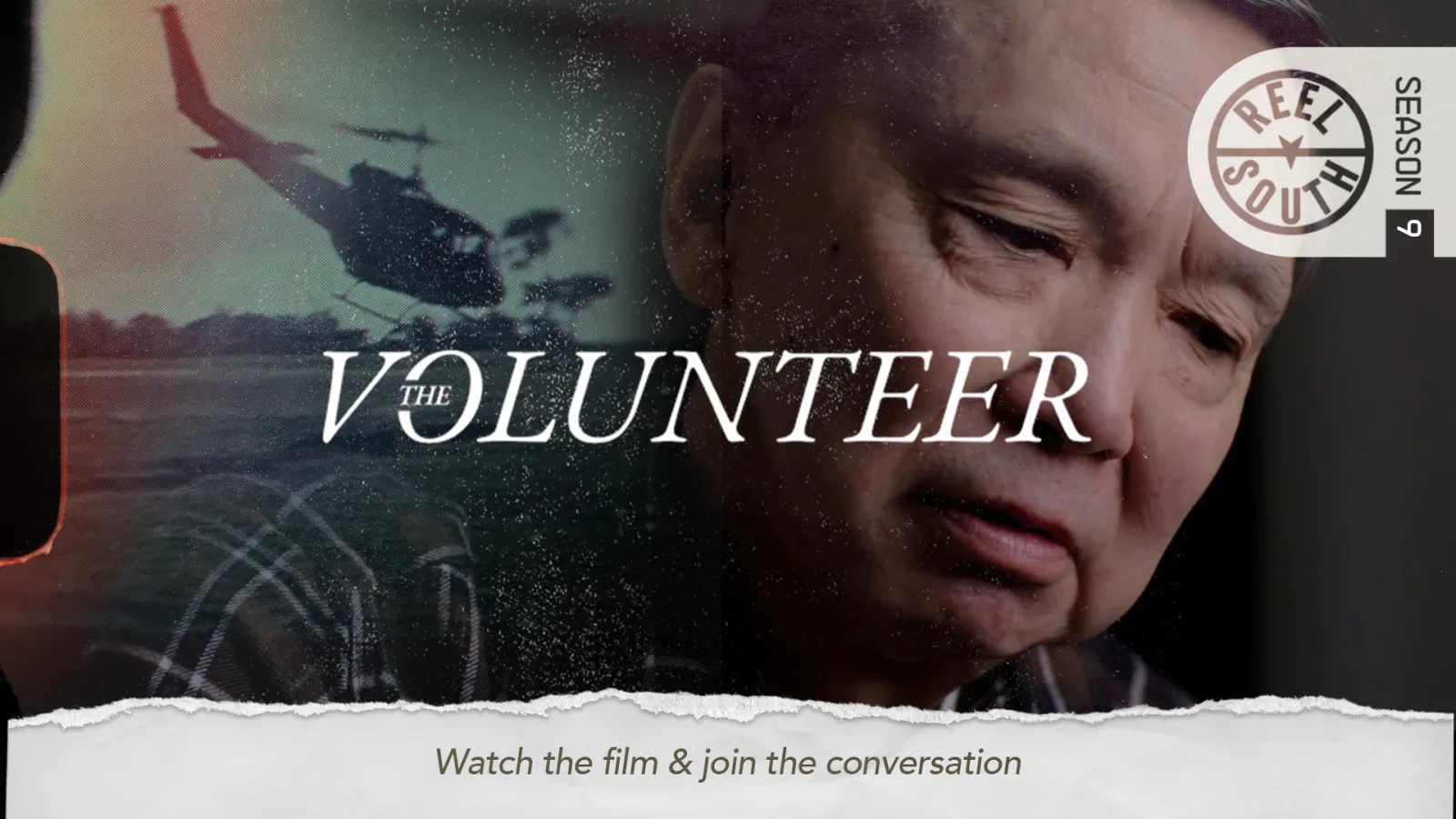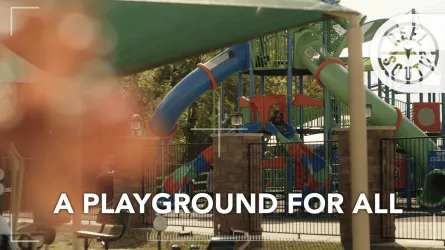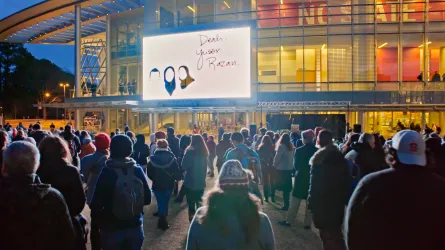Reel South Season 9 premiere begins with "The Volunteer" from David Brodie. The film features two Vietnam War veterans reuniting and highlights the struggle of a Japanese-American veteran to overcome his feelings of guilt and anger, and find a sense of belonging, after being mistaken for the enemy by fellow U.S. forces during the Vietnam War. Before the Reel South premiere, digital producer Heather Nunerley spoke with the filmmaker to learn more about the film's creation and any insight he has for future documentary filmmakers.
Stream "The Volunteer" today on PBS here.
This interview has been edited for length and clarity
Heather: Bruce and LV's relationship shines a light on the bond of brotherhood and the complexities of race and war, among other themes. What is the number one thing you hope Reel South and PBS viewers take away from your film?
David: Any insights the film offers about identity, race, and brotherhood come thanks to Bruce and LV, and I’m reluctant to put any of those ideas into my own words. But I will say that I believe we as a country need to rethink our relationship with the armed forces. Too many pockets of American society take the military for granted. The entire public needs to take responsibility for the way our government deploys its military and for caring for the people who have served when they come home.
Heather: Your site goes into how you and Bruce met, but can you describe the one moment in the string of conversations you had together that solidified the beginning of the creation of the film?
David: In the beginning, I really didn’t know what the film would be about, or if there was a film to be made at all. I was getting to know Bruce through regular lunches, thought he was funny and interesting, and knew that he had stories to tell from his time in the Army. So for our first day of shooting, I asked Bruce to shuffle through photos from his life and tell me what they depicted, just to see what would happen. Right away Bruce grabbed a snapshot of himself as a one-year-old, standing in the dirt with one of those full-faced baby smiles of pure joy. And behind little Bruce you could see the barracks of the internment camp where Bruce was born and his family was confined. Bruce’s innocent expression made me think of my own son, who at that time was about the same age as the kid in the photo. To imagine my son toddling behind barbed wire, under the eyes of armed guards, made me feel sick, angry, and just incredulous that this could happen at all. And of course, I’d learned about the internment camps long before I met Bruce, and rationally knew that they were wrong, but seeing someone I knew, someone I was sitting next to, trapped in a camp as a toddler, shocked me into understanding this really did happen, right here, very recently. And I realized that whatever story our film would tell, it had to generate the empathy and understanding I experienced when I first saw that photo.
Heather: Is there anything in the film you wished you could have included? Or were there any moments you didn't have on film you wish you captured?
David: I do wish we had the time to give more attention to the people and organizations who helped Bruce get through his toughest times, especially Meals on Wheels West, and volunteer Chris Gordon-Clarke, who delivered meals to Bruce for years, making sure he had food and someone to talk to. And Bruce was incredibly grateful to the National Center for PTSD in Menlo Park, which helped him process much of his pain and trauma.
Heather: What was the biggest challenge in the creation of The Volunteer?
David: I’m so grateful to Bruce for trusting me with his story. As important as it was for him to make a record of what he experienced, the process of recounting the most painful and consequential moments of his life was incredibly taxing for him. So I felt a responsibility to do his story justice, but didn’t know if I was up to the task, especially since I haven’t gone through any of what Bruce endured, and have a radically different relationship with my country and my identity than Bruce did. So during production, Bruce and I had long conversations about what the film would cover, what it would leave out, and the broader themes it should explore. I didn’t want to approach the process with the usual divide between a documentarian and the subject; it had to be a collaboration between me and Bruce.
But shortly after production finished, Bruce passed away. I was heartbroken at the loss of my friend, and also wondered if I'd be able to finish his film without Bruce.
Through the process of organizing the online memorial for Bruce (as this all happened during the pandemic) I got to know Bruce’s sister, Christine. After a few long conversations I asked her to collaborate as our Consulting Producer, to ensure that the themes and ideas of the film rang true, and that the film honored the wishes of the Nakashima family. Her insights were invaluable into the film’s development. I’m also grateful to a group of trusted friends, colleagues and family members who watched many iterations of the film and gave their own thoughts about what felt authentic, what seemed trite or forced, and where the film needed to go deeper.
Heather: What advice would you give aspiring documentary filmmakers?
David: First, if you have an idea, whatever it is, don’t wait for permission or the perfect resources. Just start capturing the story, finish as best you can, then move on to the next thing. Don’t be precious about it. And second, try different roles. Produce or edit your friend’s short film, work as a camera assistant or a DIT. Whatever you get an opportunity to do, try it. Understanding the different roles will make you a better director, writer, or whatever it is you ultimately want to do.
Heather: Do you have anything to brag about? Any new projects or highlights to share?
David: I’m most proud of the reaction The Volunteer has received from the Veteran community. We’ve had a few screenings with Veteran groups, and have a few more scheduled in the next year, and it’s been truly humbling to witness the conversations the film has provoked. I’ve met so many incredible people thanks to Bruce’s story.
In terms of other projects, I’m currently developing another documentary which is very much in the beginning stages. But as an editor I’ve been lucky to work on some great films in the last year, most recently The Greatest Night in Pop for director Bao Nguyen. That project and The Volunteer are about as different as two films can be! But it was a joy to work on something so uplifting.
Category
Share


